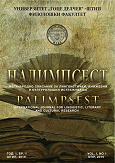HIKIKOMORI: ANALISI LINGUISTICA E PROPOSTE DI TRADUZIONE IN LINGUA ITALIANA DI UN NEOLOGISMO 2.0
Hikikomori: Linguistic Analysis and Translation Suggestions in Italian Language of a 2.0 Neologism
Author(s): Mariantonia TramiteSubject(s): Language studies, Language and Literature Studies, Translation Studies
Published by: Универзитет »Гоце Делчев« - Штип
Keywords: hikikomori; linguistic analysis; neologisms; translation; Italian.
Summary/Abstract: The paper will examine the word hikikomori through a linguistic analysis: it is referred to as a social phenomenon born in Japan regarding typical adolescents and young adults, also known as social withdrawal: from the Japanese country, which then managed to spread to other industrialized continents, e.g. Europe, until it touched and began to be finally known in various countries, such as Italy. Through this paper, the expression hikikomori will be investigated from a linguistic point of view: first and foremost, a brief story of the term will be described, from the 17th century until nowadays, including the examination of the kanji (ideograms) in which the word used to be and is written, and how it was and is read. The purpose of this paper refers to finding one or more specific translations in the Italian language of hikikomori: in particular, phrasemes have been chosen as a possible translational solution; a [substantive + adjective] structure has been preferred instead of a [substantive + verb] form and, in the end, five possible linguistic phrasemes have been suggested. A fit translation is to be found in eremiti (nativi) digitali or eremiti dell’era digitale: these expressions would be helpful for people who are ignorant in regard to neologisms and words usually labelled as foreignisms. The final goal of this work is for these individuals to fathom and to be familiar with a word typical of 21st century, entered in modern dictionaries.
Journal: Палимпсест, Меѓународно списание за лингвистички, книжевни и културолошки истражувања
- Issue Year: 5/2020
- Issue No: 09
- Page Range: 41-51
- Page Count: 11
- Language: Italian

